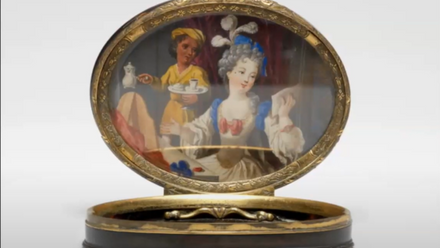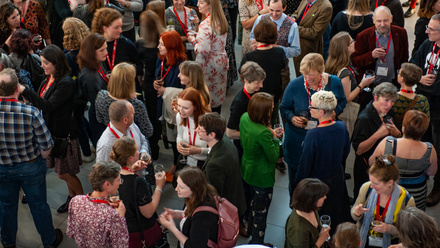I didn’t want to write this. It is hard, and painful, to think about the senseless killing of George Floyd and so many others, but we all must, as preservers of culture and history.
It is easy, particularly in the UK, to put historic problems of slavery and colonialism aside and ignore them, or assume they’ve been resolved. But we must look both within ourselves and at every facet of UK society to see where we can all improve. I have no concrete solutions to racial discrimination; I only have my own experiences and the various socio-economical, pedagogical, and organisational studies that give credence to them, so let these be a starting point to this conversation.
As a conservator, I have very few people to talk to about the subject of race in arts and heritage sector, namely because I am one of possibly a handful black conservators living in the UK, and I'm not even British. I'm a U.S. citizen, born in Virginia, the home of the seditious, racist Confederacy. By my father, I am African-American, the descendant of slaves. Through my mother, I am also a first generation Eritrean American. However, in the eyes of most people, and notwithstanding the deep division that exists between African-Americans and Africans, I am without question “Black”.
I didn’t want to make myself known solely in this way, and I didn’t want the entire focus of my career to suddenly boil down to the fact that I’m Black. But neither am I ashamed of my race, or the experiences I have had because of it.
So you ask: what is it like to be Black in the arts and heritage sector?
I won’t hide that, overall, the UK higher education system has been a good experience for me: I received a BA in Art History from the University of Manchester and subsequently an MA at Camberwell in the Conservation of Works on Paper. My experience in the UK job market, however, is a very different story. Indeed, research studies show that Black people in the UK rarely pursue courses in the humanities because there is little success in it for them.
Further, academic roles are few and far between, and the pay is minimal across both public and private sectors, which means that while they could pursue a career of passion, they would most likely end up impoverished. Yes, we can say pay shouldn’t matter, but because of the black-white economic gap (particularly in London), it cannot be in dispute that, against this backdrop, Black people are far less likely to consider - let alone succeed - in this career path.
The exclusion of Black people is palpable. As exemplified in the TATE Workforce Diversity Profile, inconvenient facts are frequently diluted by the powers that be through the rounding up of all non-white groups as “BAME”. When scrutinised more closely in the pre-BAME classification research of the Equality and Diversity within the Arts and Cultural Sector in England Review of 2013, it becomes apparent that Black British employees made up less than 1% of the workforce across the board, versus the 7% of minorities when observed as a whole. Additionally, many academic attempts at racial inclusion have been ignored by staff: like the scheme to educate white professors on cultural and racial sensitivity at Cambridge. These failures of inclusion in education and the professional arts and heritage sector, compounded over the years since the Equal Opportunities Act of 2010, now result in an arts and heritage sector that still significantly lags in diversity.
It is depressing to see that equal opportunity policies do not translate into widespread opportunities for black people. On a personal level, it is even more depressing to me that despite being Black and having equivalent experience and grades as my conservation peers and alumni, I've only been offered one role by a public institution in five years of applying consistently for every paper conservation role advertised in the Southwest of England, and I rarely get invited to interviews. I now have a successful private conservation business and never looked back on my exclusion from public sector contracts as the product of racism, but if I am indeed one of a handful of black conservators in this country, why have I not been inundated with interviews based on the multitude of equal opportunity questionnaires at the end of these applications?
We as conservators and professionals in the Arts and Heritage sector need to do more to include Black talent into our profession. The good news is that we have already built the framework for inclusion; we just need to promote and enforce it.
Observations and proposals
What is happening in America is the propagation of racism, illegally, within all levels of public institutions. What is happening on a covert but still insidious level on both sides of the pond is the unwitting, yet systematic, exclusion of Black people. It is as though everyone has decided to 'not see colour' without realising that that, in itself, is an act of exclusion. Inclusion means seeing colour and supporting equal opportunity by listening.
Please also respect that at the same time this has been a very tiring time for all Black people. We may be on edge, we may be angry, but wouldn’t you be if you had to explain your self-worth repeatedly?
If you still don’t understand the necessity of this conversation, I just want you to know that I wish someday I can look out to an Icon seminar or a TATE talk and see a multitude of different ethnicities, all passionate about preserving History, even the painful parts, with bravery and collaboration, and support for each other. I am here as a U.S. citizen and British resident to say that now is the time for us to look within, to truly ask ourselves if we are doing enough to achieve equality, and what exactly is stopping us from doing more?
As I said in my Instagram post, we are all at risk of dissociation through ignorance, and we all must work to respect and protect human rights, or else there is no point to the preservation of culture and history at all.
Ashleigh Brown is a paper conservator and co-owner of The Conservators Ltd.






